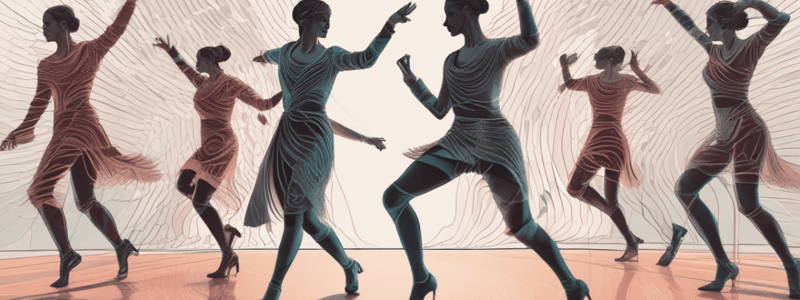Podcast
Questions and Answers
What is the benefit of immersing yourself in diverse dance styles?
What is the benefit of immersing yourself in diverse dance styles?
- To focus solely on spatial awareness
- To master a single dance style
- To specialize in a specific dance technique
- To expand your repertoire and create more versatile choreography (correct)
What is essential to develop before delving into spatial awareness and foot placement?
What is essential to develop before delving into spatial awareness and foot placement?
- Mindful movement (correct)
- Foot placement exercises
- Body alignment
- Core stability
What helps in maintaining balance and control during movement?
What helps in maintaining balance and control during movement?
- Weight distribution
- Scanning the space
- Core stability (correct)
- Body alignment
What is crucial for executing dance movements effectively and safely?
What is crucial for executing dance movements effectively and safely?
What type of exercises can help train muscles and improve precision?
What type of exercises can help train muscles and improve precision?
What should you do when scanning the space?
What should you do when scanning the space?
Why is weight distribution important in dance?
Why is weight distribution important in dance?
What is essential for adjusting foot placement in choreography?
What is essential for adjusting foot placement in choreography?
What type of exercises can help develop balance and spatial awareness?
What type of exercises can help develop balance and spatial awareness?
What is the benefit of incorporating footwork into choreography?
What is the benefit of incorporating footwork into choreography?
What is the primary purpose of syncopation in dance?
What is the primary purpose of syncopation in dance?
What is essential for mastering pivot turns and spins?
What is essential for mastering pivot turns and spins?
What is the main benefit of quick direction changes in dance?
What is the main benefit of quick direction changes in dance?
What is the primary focus of Module 3?
What is the primary focus of Module 3?
What is floorwork in dance?
What is floorwork in dance?
Why is it important to spot your focus point during pivot turns?
Why is it important to spot your focus point during pivot turns?
What is the result of mastering advanced footwork techniques?
What is the result of mastering advanced footwork techniques?
What is required to master advanced footwork techniques?
What is required to master advanced footwork techniques?
What is essential for continuous learning and growth in dance?
What is essential for continuous learning and growth in dance?
What is the primary role of footwork in dance routines?
What is the primary role of footwork in dance routines?
What is syncopation in footwork?
What is syncopation in footwork?
What is the benefit of incorporating weight shifts into footwork?
What is the benefit of incorporating weight shifts into footwork?
What is important for creating fluid and cohesive choreography?
What is important for creating fluid and cohesive choreography?
Why is it essential to experiment with different dance styles?
Why is it essential to experiment with different dance styles?
What is the result of incorporating footwork combinations into choreography?
What is the result of incorporating footwork combinations into choreography?
What is the benefit of incorporating direction changes into footwork?
What is the benefit of incorporating direction changes into footwork?
What is important for creating captivating footwork combinations?
What is important for creating captivating footwork combinations?
Why is it essential to take the time to familiarize yourself with basic footwork elements?
Why is it essential to take the time to familiarize yourself with basic footwork elements?
What is the purpose of visualization and mental rehearsal in improving speed and accuracy?
What is the purpose of visualization and mental rehearsal in improving speed and accuracy?
What should you do before starting any strength and stamina training program?
What should you do before starting any strength and stamina training program?
What is the purpose of progressive overload in building strength?
What is the purpose of progressive overload in building strength?
Why is nutrition important for supporting strength and stamina goals?
Why is nutrition important for supporting strength and stamina goals?
How often should you rest and recover between workouts?
How often should you rest and recover between workouts?
What is the benefit of incorporating high-intensity interval training (HIIT) into your routine?
What is the benefit of incorporating high-intensity interval training (HIIT) into your routine?
What should you do when setting clear goals?
What should you do when setting clear goals?
Why is it important to track your progress?
Why is it important to track your progress?
What is the primary focus of Module 4?
What is the primary focus of Module 4?
What is the benefit of incorporating cardiovascular exercise into your routine?
What is the benefit of incorporating cardiovascular exercise into your routine?
What is the main focus of the Mirror Drill?
What is the main focus of the Mirror Drill?
What is crucial for improving speed and accuracy in various activities?
What is crucial for improving speed and accuracy in various activities?
What is the benefit of shadow boxing in combat sports?
What is the benefit of shadow boxing in combat sports?
What is the role of mental focus and concentration in enhancing speed and accuracy?
What is the role of mental focus and concentration in enhancing speed and accuracy?
What is the purpose of regularly practicing hand-eye coordination exercises?
What is the purpose of regularly practicing hand-eye coordination exercises?
What is the benefit of incorporating regular practice sessions into your training routine?
What is the benefit of incorporating regular practice sessions into your training routine?
What is the role of a metronome or timer in improving speed and accuracy?
What is the role of a metronome or timer in improving speed and accuracy?
What is the focus of Module 4?
What is the focus of Module 4?
What is the result of incorporating exercises into your training routine?
What is the result of incorporating exercises into your training routine?
What is essential for improving footwork skills?
What is essential for improving footwork skills?
What is the primary goal of the cone agility drill?
What is the primary goal of the cone agility drill?
What is the main focus of the ladder drill?
What is the main focus of the ladder drill?
What is the box drill used for?
What is the box drill used for?
What is the benefit of incorporating these drills into your training routine?
What is the benefit of incorporating these drills into your training routine?
What type of sports can benefit from these footwork drills?
What type of sports can benefit from these footwork drills?
What is the purpose of the cone agility drill?
What is the purpose of the cone agility drill?
What type of footwork can be performed in the box drill?
What type of footwork can be performed in the box drill?
What is the benefit of the ladder drill variation?
What is the benefit of the ladder drill variation?
Flashcards are hidden until you start studying
Study Notes
Advanced Footwork Techniques
- Module 3 focuses on advanced footwork techniques to enhance dance skills, requiring a strong foundation in basic footwork.
- Four advanced footwork techniques are explored: syncopations and complex rhythms, pivot turns and spins, quick direction changes, and floorwork and transitions.
Syncopations and Complex Rhythms
- Syncopation is a technique used to create unexpected accents and rhythms within a dance routine.
- It adds complexity and depth to footwork, helping to develop a unique style.
Pivot Turns and Spins
- Pivot turns and spins are essential footwork techniques in many dance styles.
- They require good balance, coordination, and control.
- Practice pivot turns by starting with a simple two-step turn, gradually increasing speed and complexity.
Quick Direction Changes
- Quick direction changes involve shifting weight and changing direction rapidly.
- This technique adds dynamics and excitement to choreography.
- Practice transitioning smoothly between different footwork patterns while changing direction abruptly.
Floorwork and Transitions
- Floorwork is a technique that involves dancing on or close to the floor.
- It adds variety and creativity to footwork.
- Experiment with different ways of moving on the floor, such as slides, rolls, and crawls.
Incorporating Footwork into Choreography
- Mastering footwork techniques elevates choreography, adding rhythm, dynamics, and style.
- Understanding basic footwork elements (stepping, sliding, tapping, and pivoting) is essential.
- Enhance dynamics with footwork by using syncopation, weight shifts, and direction changes.
Footwork Combinations
- Incorporate footwork combinations into choreography by stringing together multiple steps.
- Create captivating footwork combinations by contrasting different footwork elements.
- Pay attention to transitions between footwork combinations, ensuring fluid and cohesive choreography.
Exploring Different Dance Styles
- Footwork techniques vary across different dance styles (jazz, hip-hop, contemporary, salsa).
- Explore a range of genres and incorporate elements from each into choreography.
- This expands repertoire and creates more versatile and engaging choreography.
Spatial Awareness and Foot Placement
- Spatial awareness and foot placement are crucial in executing dance movements effectively and safely.
- Develop a mindful approach to movement, scanning the space, and maintaining core stability.
- Proper body alignment and weight distribution are essential for foot placement.
- Practice foot placement exercises, such as foot drills, balance exercises, and obstacle courses, to improve precision.
Spatial Awareness in Choreography
- Pay attention to spatial dimensions of movements when learning choreography.
- Consider direction, level changes, and distances between dancers.
- This awareness allows for adjusting foot placement accordingly, enhancing the overall fluidity and synchronicity of the performance.
Footwork Drills and Exercises
- Module 4 focuses on footwork drills and exercises to improve agility, balance, coordination, and overall footwork technique.
- These drills are essential for athletes or individuals who want to enhance their performance in sports such as basketball, soccer, tennis, and martial arts.
Cone Agility Drill
- The cone agility drill is a basic yet effective exercise that focuses on improving agility, acceleration, and lateral movements.
- Set up a line of cones approximately one yard apart and weave in and out of the cones as quickly as possible, maintaining proper form and technique.
Ladder Drill
- The ladder drill is a common footwork exercise that helps improve foot coordination, speed, and agility.
- Lay an agility ladder on the ground and step into the first square with one foot, then quickly bring the other foot into the same square.
- Repeat this pattern until you reach the end of the ladder.
Box Drill
- The box drill is a versatile drill that can be modified to target different aspects of footwork.
- Start by marking four cones to form a square with equal distances between each cone.
- Perform various movements around the square, such as forward running, backward running, side-shuffling, and crossover footwork.
Mirror Drill
- The mirror drill is a partner drill that emphasizes footwork synchronization, reaction time, and coordination.
- Pair up with a training partner and take turns being the leader and the follower.
- The leader performs a series of footwork movements, and the follower mirrors the leader's movements as closely as possible.
Shadow Boxing
- Shadow boxing is a common drill used in combat sports to practice footwork and technique without an opponent.
- Stand in front of a mirror or an open space and begin performing punches, kicks, and defensive movements while focusing on footwork patterns.
Improving Speed and Accuracy
Techniques and Strategies
- Module 4 focuses on techniques and strategies to improve speed and accuracy in various activities.
Proper Technique
- Developing the correct technique for the activity you are performing lays the foundation for improvement.
- Take the time to learn and practice the correct form or posture specific to your chosen activity.
Mental Focus and Concentration
- Mental focus and concentration play a significant role in enhancing speed and accuracy.
- Minimize distractions and create a quiet and comfortable environment to improve your focus.
Hand-Eye Coordination
- Hand-eye coordination is essential for activities that require precision, such as playing sports or crafting.
- Regularly practice hand-eye coordination exercises like juggling, throwing and catching balls, or playing video games that require quick reflexes.
Regular Practice Sessions
- Consistency is key when it comes to improving speed and accuracy.
- Dedicate regular practice sessions to your chosen activity and break down the tasks into smaller components.
Use of Metronome or Timer
- A metronome or timer is an excellent tool to improve speed and accuracy.
- For activities that involve rhythm or timing, practice alongside a metronome and start with a slower tempo, gradually increasing the speed as you become comfortable.
Visualization and Mental Rehearsal
- Visualization is a powerful technique used by athletes and performers to enhance their performance.
- Before performing a task, take a moment to visualize yourself executing it with speed and accuracy.
Building Strength and Stamina
Understanding Your Body's Current Capabilities
- Before starting any strength and stamina training program, it's important to understand your body's current capabilities.
- Assess your level of fitness and consult with a healthcare professional if needed.
Setting Clear Goals
- Setting clear and specific goals is crucial for measuring your progress and staying motivated.
- Write down your goals and make a plan to achieve them.
Incorporating Resistance Training
- Resistance training is key to building strength.
- Include exercises that target major muscle groups, such as squats, deadlifts, bench presses, and rows.
Progressive Overload
- To continue building strength, it's important to progressively overload your muscles.
- Gradually increase the amount of weight or resistance you use during your workouts.
Including Cardiovascular Exercise
- Incorporate cardiovascular exercise into your routine to improve stamina.
- Activities such as running, cycling, swimming, or brisk walking can help improve your endurance.
High-Intensity Interval Training (HIIT)
- HIIT workouts are effective in building stamina and boosting overall cardiovascular fitness.
- These workouts involve short bursts of intense exercise followed by short periods of rest or lower-intensity exercise.
Proper Nutrition and Hydration
- Eating a balanced diet that includes lean proteins, whole grains, fruits, and vegetables is essential for supporting your strength and stamina goals.
- Stay hydrated throughout your workouts and throughout the day to maintain optimal athletic performance.
Rest and Recovery
- Rest and recovery are just as important as the workouts themselves.
- Allow your body time to recover between workouts to prevent injuries and optimize your results.
Monitoring Progress
- Keep track of your workouts, including the exercises, weights, reps, and sets performed.
- Use a fitness app or workout journal to keep track of your data and monitor your progress.
Consistency and Motivation
- Consistency is key to building strength and stamina.
- Stick to your training program, celebrate small milestones, and stay motivated to achieve your goals.
Studying That Suits You
Use AI to generate personalized quizzes and flashcards to suit your learning preferences.




